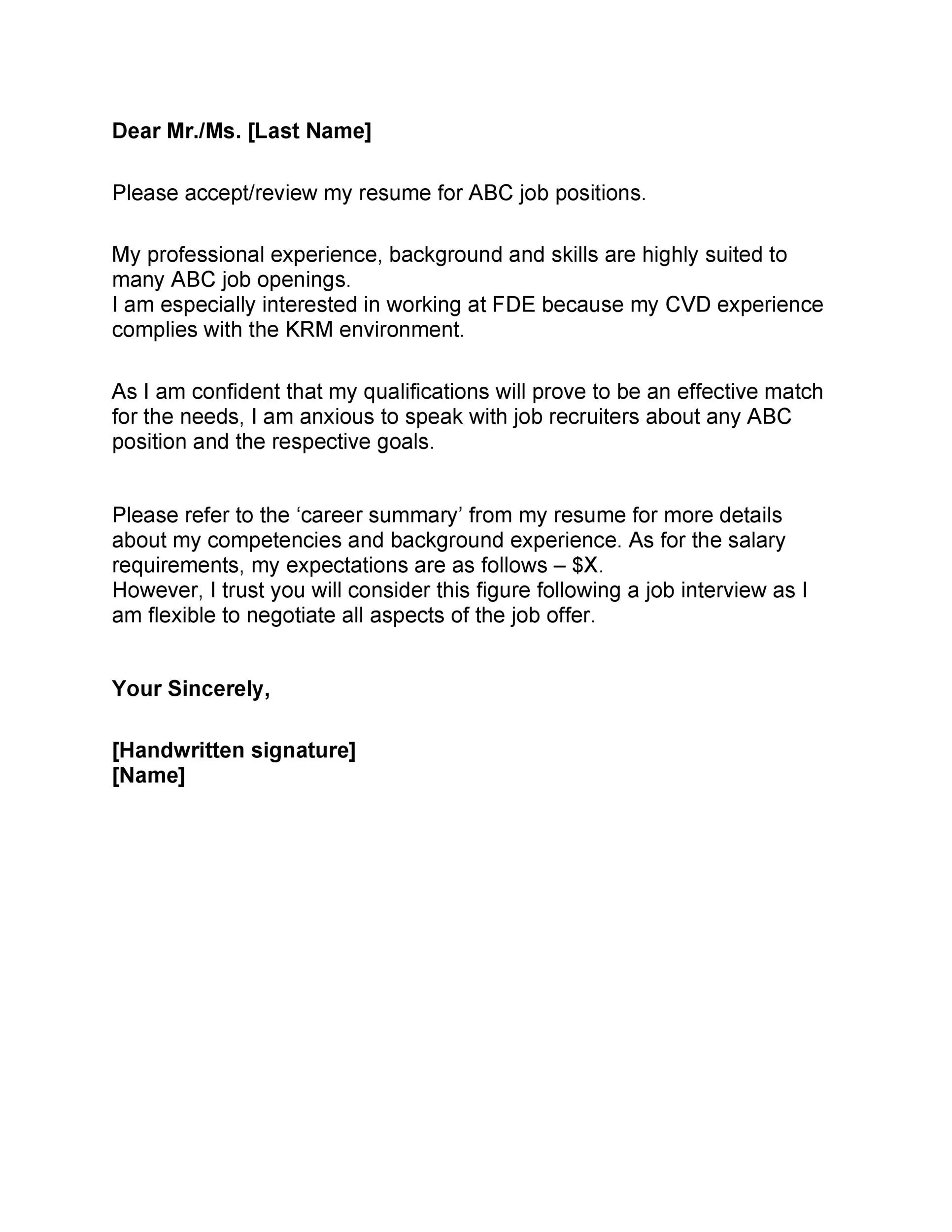Why Include Salary Needs in Your Cover Letter?
Mentioning your salary expectations in a cover letter can be a strategic move, but it’s not always necessary. Some job seekers believe it’s crucial to address salary early, while others prefer to delay the discussion until later stages of the hiring process. Including your salary needs upfront can save both you and the employer time by ensuring that your expectations align with the budget for the position. This transparency prevents potential disappointments down the line, where you might be offered a role with a salary that doesn’t meet your needs. It also demonstrates your professionalism and your understanding of the hiring process. The decision to include your salary requirements hinges on various factors, including the specific job, industry norms, and your personal comfort level.
The Employer’s Perspective on Salary Discussions
Employers often want to know your salary expectations for budgeting and comparison purposes. They need to understand if your requirements are within their financial capacity for the role. Including a salary range can be particularly helpful for the employer as it provides them with flexibility. It helps them determine if your expectations align with what they are prepared to offer. In some instances, not including your salary expectations might lead the employer to assume you are unwilling to negotiate. In other cases, it might not be a critical factor. Employers usually have a predetermined salary range for each position, so your response should be in alignment with the industry trends and your experience. Employers want to know your worth and how you value yourself.
When to Mention Salary Requirements
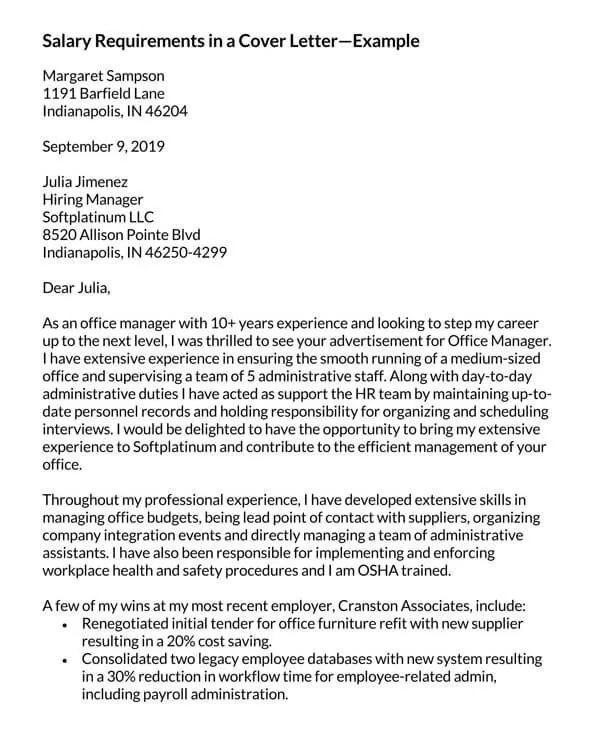
The optimal timing for mentioning salary expectations in your cover letter depends on the job advertisement’s instructions, your industry, and your comfort level. If the job posting explicitly requests your salary expectations, it is essential to comply. This demonstrates that you are paying attention to detail and are following the employer’s instructions. Even if not explicitly requested, there are still scenarios where including your salary expectations is appropriate. This usually happens when you are applying for a position where the salary range is not specified. Always consider the specific job and the culture of the organization.
Early in the Cover Letter
In some cases, you might choose to include your salary expectations near the beginning of your cover letter, after introducing yourself and stating the position you’re applying for. This can work well if the job ad specifically asks for it, or if you’re certain about your salary needs and want to ensure alignment from the start. By mentioning your salary early, you signal that you have a clear understanding of your value and are comfortable discussing compensation. This approach can save time for both you and the employer.
Later in the Cover Letter
Alternatively, you can address salary expectations towards the end of your cover letter, after you have highlighted your skills, experience, and why you are a good fit for the role. This is a more cautious approach, allowing you to first impress the employer with your qualifications. This method is best when the job advertisement does not specifically request a salary. This approach can be very useful if you are unsure of the market trends for the position.
How to Phrase Your Salary Expectations
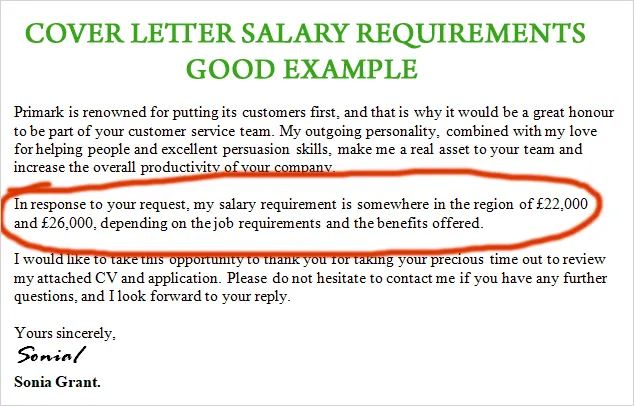
The way you phrase your salary expectations can significantly influence how the employer perceives you. Clarity, professionalism, and flexibility are key. Whether you choose to state a specific number, a range, or defer the discussion, ensure your language is confident and reflects your understanding of industry standards. You need to show your value and what you bring to the table. Consider your level of experience, the job’s responsibilities, and the location when deciding how to frame your salary requirements.
Using a Salary Range
Providing a salary range is a common and often effective strategy. This approach gives the employer flexibility while still indicating your minimum acceptable compensation. When providing a salary range, make sure the range is realistic and reflects your research. It is also essential to avoid offering a range that is too broad. A good rule is to provide a range that is no more than 10-15% difference between the lowest and highest figures. For example, if you are targeting a salary of $60,000, your range could be $58,000 - $65,000. This shows you understand the market and are willing to negotiate.
Stating Your Desired Salary
If you have a very clear idea of the salary you want, or if you want to avoid negotiation, you may choose to state your desired salary directly. This should be done only if you are certain of the market value for your skills and experience. When stating a specific number, make sure you are prepared to defend it during the interview. Your number should be based on thorough research. For instance, you could write, “My salary expectation for this role is $70,000 per year.” This shows confidence but might limit your negotiating room. So always assess the risk and reward.
What to Avoid When Discussing Salary
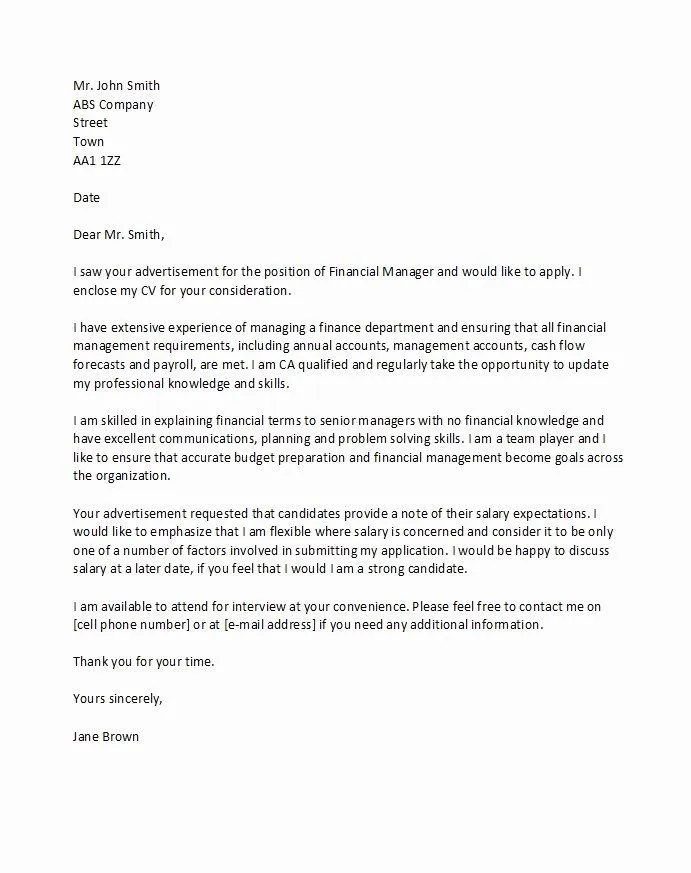
There are certain phrases and approaches to avoid when discussing salary in your cover letter. Avoid sounding demanding or inflexible. Refrain from using vague phrases such as “competitive salary” or “negotiable.” These phrases don’t provide any useful information to the employer. Do not discuss your previous salary unless specifically asked. Doing so can sometimes limit your chances because the employer might compare your current salary with the new role. Avoid revealing too much about your personal financial situation, as this is not relevant to your professional qualifications.
Negotiating Salary in Your Cover Letter
Your cover letter is not the ideal place to conduct a full-blown salary negotiation. Focus on demonstrating your skills and qualifications and stating your expectations professionally. If you are open to negotiation, you can indicate this with phrases like, “I am open to discussing salary based on the responsibilities and requirements of the role.” Always be prepared to discuss salary in an interview. Be ready to justify your expectations and be open to discussing the salary range the employer has in mind.
The Importance of Researching Salary Ranges
Before including salary expectations in your cover letter, thorough research is crucial. Understanding the typical salary range for the position and your experience level in your location is essential. Over or underestimating your value can hinder your chances. Research helps you to position yourself competitively and increases your chances of getting an offer. A well-researched salary range demonstrates your professionalism and understanding of the job market. Also, it can give you a valuable negotiating point.
Tools and Resources for Salary Research
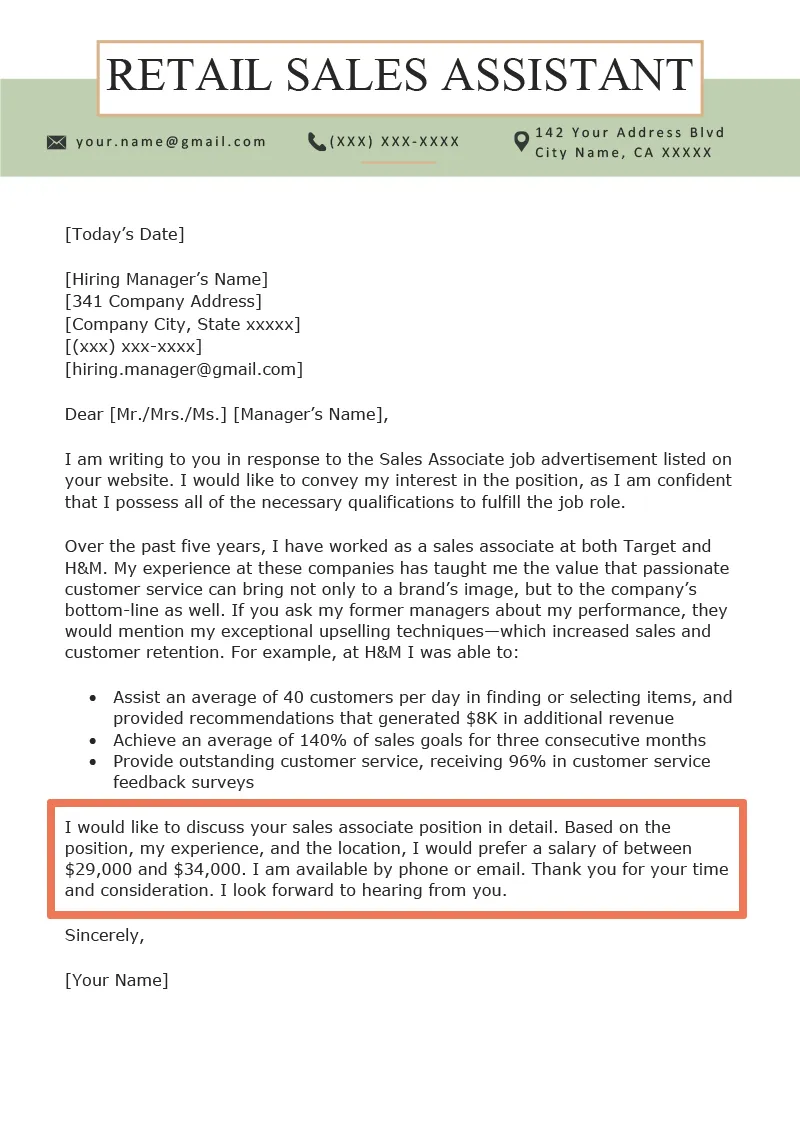
Various online resources can assist you in researching salary ranges. Websites like Glassdoor, Salary.com, and Payscale provide salary data based on job title, location, and experience level. LinkedIn also offers insights into salary trends. Other sources include industry-specific salary surveys and data published by government agencies. Remember to cross-reference multiple sources to get a comprehensive view. Use these tools to inform your expectations and give you confidence.
Tailoring Your Salary Approach to the Job
The approach you take in including salary needs should be customized based on the type of job and your career stage. Entry-level positions, mid-career roles, and senior-level positions each demand a unique approach. Tailoring your approach demonstrates your understanding of the job market and your ability to adapt to different situations.
Entry-Level Positions
For entry-level positions, you might not have much negotiating power. A salary range helps indicate that you are flexible and open to learning. Emphasize your enthusiasm and willingness to gain experience. In this case, you can state a range or mention that your salary expectations are in line with entry-level industry standards. Research the average salary for entry-level roles in your field.
Mid-Career Professionals
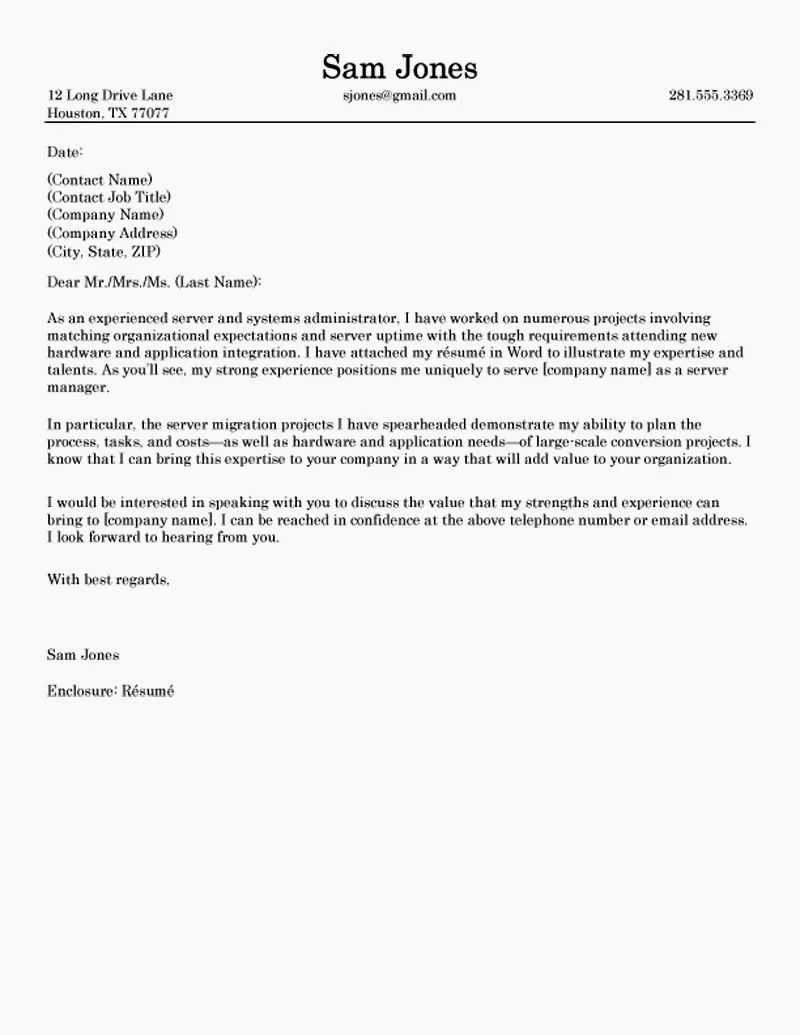
Mid-career professionals should be more confident and provide a more specific salary range or desired salary. You have more experience, skills, and a proven track record. You should research the market rates for your role and experience. Be prepared to support your expectations with your achievements and contributions. Focus on the value you bring to the organization. Use your track record as leverage for a higher salary.
Senior-Level Candidates
Senior-level candidates should clearly state their expectations. At this level, compensation is usually very important. Providing a clear salary expectation, or a narrow range, is suitable. You should be prepared to justify your expectations with your experience, leadership skills, and previous successes. Negotiating a salary is often expected for senior roles. You will have more negotiating power and a greater ability to influence the salary.
Cover Letter Salary Examples
Here are a few examples of how you might include salary expectations in your cover letter. These examples illustrate different approaches for various situations, from stating a range to avoiding direct salary mention. Remember that the best approach depends on the job description and your comfort level.
Example 1 Stating a Range
“Based on my experience and research, I am seeking a position with a salary range of $65,000 to $75,000 per year. I am open to discussing this further based on the specific responsibilities and benefits package.”
Example 2 Stating a Specific Number
“My salary expectations for this role are $72,000 per year. I am confident that my skills and experience align with the requirements, and I am eager to contribute to your team.”
Example 3 Avoiding Direct Salary Mention
“I am very interested in the [Job Title] position and believe my skills and experience are a strong fit. I am eager to discuss my compensation expectations during the interview process, based on the responsibilities and the overall compensation package.”
